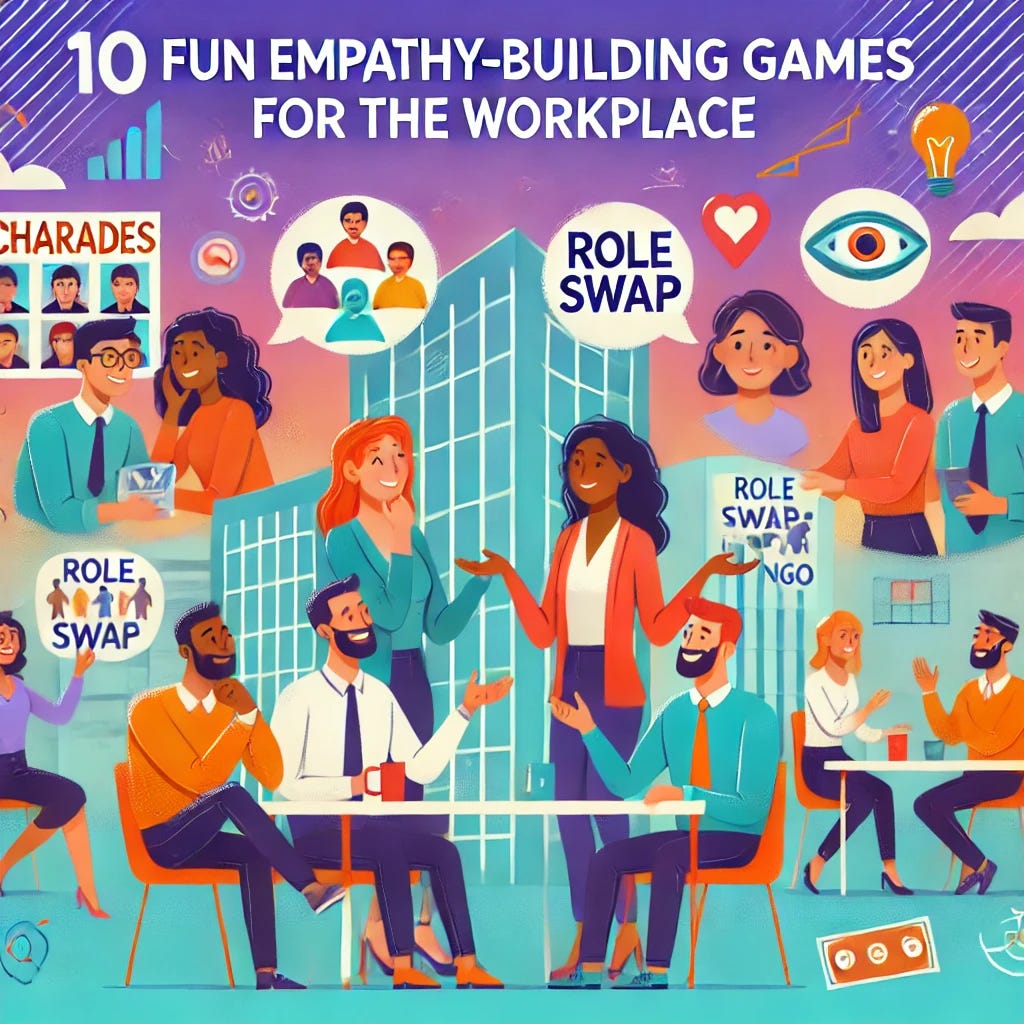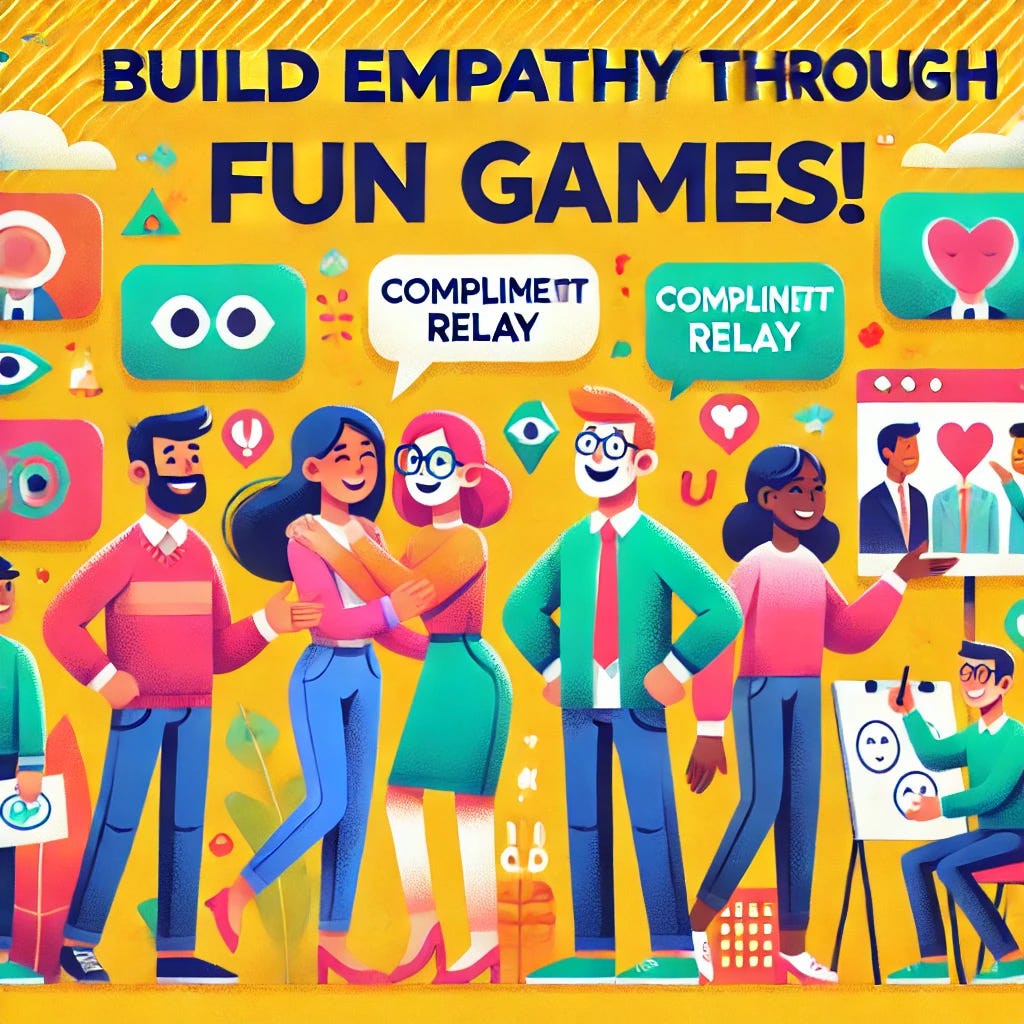10 Empathy-Building Games for Work Culture (That Are Also Surprisingly Fun!)
These gamified activities turn empathy into a skill you can hone, one laugh at a time.
Empathy can feel a bit mysterious—like finding matching socks after laundry day. But it doesn’t have to be! These gamified activities turn empathy into a skill you can hone, one laugh at a time.
1. Blind Drawing
How it Works: Pair up, with one person describing an image and the other drawing it… without seeing it.
Outcome: Improves clarity and patience. Real Scene Example: In a fast-paced marketing firm, blind drawing helps team members learn to communicate ideas precisely. You know, so people stop using “let’s make it pop” as feedback.
2. Two Truths and a Lie - Team Edition
How it Works: Each team member shares two true things and one lie about a project or work experience. Others have to guess the lie.
Outcome: Creates openness, trust, and a little mystery. Example: At a tech startup, this game helps colleagues understand each other's work preferences—like who loves debugging code at 3 a.m. and who would rather jump in a lake.
3. Role Swap Day
How it Works: Team members switch roles for a day or a few hours. The marketer becomes the coder, and the coder gets a taste of sales.
Outcome: Builds respect for others’ roles and challenges. Example: In a healthcare setting, administrative staff might try out a nurse's shift (minus actual medical duties!) to gain a deeper understanding of frontline challenges.
4. Compliment Relay Race
How it Works: Each team member has to compliment the next person in line as quickly as possible until everyone’s had a turn.
Outcome: Promotes positivity and self-esteem. Example: In hospitality, this simple activity before a busy day helps reduce the stress of guests’ requests, turning it into a kindness relay that keeps smiles going all day long.
5. Assumption Buster
How it Works: Each person writes down an assumption they’ve made about a coworker; the group discusses them openly (with kindness and humor!).
Outcome: Decreases bias and helps everyone understand each other better. Example: At an engineering firm, teammates learn not to assume the “quiet ones” aren’t full of ideas!
6. Empathy Charades
How it Works: In small teams, each member mimics a scenario (like “end of quarter stress”) while others guess.
Outcome: Helps teams recognize and empathize with workplace stressors. Example: In a finance team, this game lightens the mood during stressful reporting periods and reminds everyone they’re in it together.
7. Weekly “What’s Your Challenge?” Round
How it Works: Each week, everyone shares one professional challenge they’re facing. The twist? You can only give empathetic responses (no advice!).
Outcome: Teaches active listening and understanding. Example: In HR, this practice leads to deeper team empathy and more patience, especially useful when resolving conflicts.
8. Reverse Brainstorming
How it Works: Instead of solving a problem, think of ways to make it worse. Then, flip the script and brainstorm solutions.
Outcome: Inspires creative problem-solving and builds empathy for various departments’ challenges. Example: In a manufacturing setting, it helps engineers and production teams work through bottlenecks with humor and empathy.
9. Positive Gossip Wall
How it Works: Create a wall where team members can write compliments or stories about each other anonymously.
Outcome: Encourages positivity and builds a supportive atmosphere. Example: In retail, this “gossip wall” transforms backrooms into places where everyone feels valued, not just for their work but their personalities.
10. “Walk in Their Shoes” Bingo
How it Works: Create a bingo card with experiences like “stayed late to meet a deadline” or “presented to a tough client.” Cross them off after experiencing them yourself.
Outcome: Empathy grows as team members try out different roles. Example: In customer service, Bingo helps teammates recognize each other’s daily challenges and makes “team player” not just a cliché!
Call to Action: "Don’t just watch your work culture; build it! 🌟 Which of these empathy games will you try first? Tag a teammate and start planning your next empathy-building session! Because the best team builders aren’t just productive—they’re understanding, supportive, and know the power of a good laugh."



